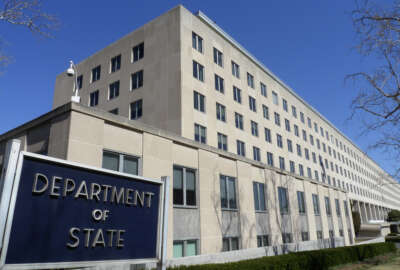Best listening experience is on Chrome, Firefox or Safari. Subscribe to Federal Drive’s daily audio interviews on Apple Podcasts or PodcastOne.
- The White House highlighted its cybersecurity priorities as agencies started to put together their 2024 budget requests. Zero trust, secure by design and training cybersecurity workers are among the top areas the Biden administration wants agencies to focus on in fiscal 2024. The White House’s cybersecurity budget planning guidance released Friday doesn’t necessary tell agencies to focus on different areas. Rather, it’s more of a reminder for them to ensure they are investing in the right priorities. These include training around IT and cybersecurity that moves beyond baseline awareness. The White House said agencies should support executive leadership training and additional programs and resources for those at the intersection of cyber and law, executive management, procurement, human capital, records management and other intersecting fields.
- Senate lawmakers want agencies to begin preparing for a quantum leap in computing. Sen. Rob Portman (R-Ohio) and Sen. Maggie Hassan (D-N.H.) introduced the Quantum Computing Cybersecurity Preparedness Act last week. It would require the White House to prioritize the migration of agency IT systems to post-quantum cryptography. The National Institute of Standards and Technology is working on quantum-proof cryptography standards. Earlier this month, NIST announced the first four algorithms that will become a part of the post-quantum standards.
- A losing bidder for the Defense Department’s multibillion dollar moving contract will be allowed to submit additional evidence in its lawsuit seeking to overturn the award. The Court of Federal Claims said American Roll-On-Roll-Off Cargo can use the additional documents to try to prove its claim that the winning bidder made false statements in its bid. ARC claims HomeSafe, the winning bidder, relied on a FedRAMP cloud security certification that it had not actually earned by the time bids were due. HomeSafe has maintained all along that it never intended to mislead the government, and that the government was not, in fact, misled.
- Low pay, few promotions, and a lengthy hiring and clearance process are just a few of the issues the State Department has with retaining an IT workforce. The Government Accountability Office said the department should develop performance indicators, baselines, milestones and targets, to track progress on improving IT recruitment. The department has made some efforts to support IT employees, including raising entry-level pay for experienced applicants. But if the department incorporates all 16 recommendations, GAO said the agency can better compete for a strong IT staff.
- The backlog of Freedom of Information Act requests continued to grow last year. The government-wide FOIA backlog rose more than 153,000 cases by the end of 2021, an increase of 8% compared to 2020. The Justice Department’s Office of Information Policy reported that COVID-19 is continuing to affect agency FOIA operations. The backlog has seen a steady increase since 2015, and some lawmakers now are calling on the Government Accountability Office to conduct a comprehensive review of the backlog’s causes and potential solutions.
- One year after the Government Accountability Office made 44 priority recommendations to the Office of Management and Budget, OMB has made only six changes. Now, GAO is providing seven additional priority recommendations. These include increasing availability and transparency of government data, reducing government-wide improper payments and establishing controls for disaster relief. GAO would also like OMB to issue a plan to implement a federal program inventory. The priority recommendations are just one part of GAO’s list. In total, OMB has 150 open recommendations, all of which are aimed to save the government money and improve its efficiency.
- Vendors providing core financial management products and services under the General Services Administration’s schedules program cannot change their contracts for the foreseeable future. GSA announced it was freezing a specific portion of Special Item Number 518210-FM to modifications and new offers. The decision comes as part of the Financial Management Quality Service Management Office’s effort to further evaluate agency needs and its acquisition strategy to provide shared services. GSA said once the analysis is completed, it will reopen the core financial services schedule to new vendors and let current schedule holders modify their products and services.
- Businesses that hire workers with disabilities for federal contracting jobs must now pay those workers at least the federal minimum wage. The AbilityOne Commission published a final rule requiring new and current contract holders to certify they will not pay their employees less than the federal minimum wage, or the state or local minimum wage, if higher. The commission expects the rule will affect 42% of nonprofits participating in the program. Vendors in the AbilityOne program sell $3.6 billion in goods and services to federal agencies every year, and employ more than 45,000 workers with disabilities in all 50 states.
- The Biden administration outlined its budget priorities for federal research and development. The White House directed agencies to prioritize making artificial intelligence trustworthy, equitable and secure as part of their fiscal 2024 R&D budget requests. A memo from the Office of Management and Budget and the Office of Science and Technology also told agencies to focus on technologies to tackle climate change and prepare for future pandemics. The administration is also calling for a whole of government approach on research to reduce, by 50%, the cancer death rate, building off the White House’s “Cancer Moonshot.”
- The Environmental Protection Agency needs to improve the transparency of its cancer assessment process for pesticides, a new report from the Office of the Inspector General said. The EPA did not follow the established transparency requirements when assessing pesticide impacts on cancer, which could affect the human-risk assessment. The report provided nine recommendations to improve transparency of the process. Those recommendations included requiring external peer review of Office of Pesticide Programs’ risk assessments that use scientifically or technically novel approaches or that are likely to have precedent-setting influence on future risk assessments. The recommendation would align with the Office of Management and Budget’s Final Information Quality Bulletin for Peer Review.
- The Government Accountability Office said the State Department needs better ways to measure progress on diversity and inclusion goals. The State Department does not effectively address root causes of its workforce disparities. A new report from the Government Accountability Office found that the lack of DEIA measurements risks using resources on the wrong solutions, and leaving barriers to equity unaddressed. Of those surveyed, 70% said the department does not hold leaders accountable for progress on diversity. GAO gives four recommendations to the agency to better evaluate its progress. (Federal News Network)
Copyright
© 2025 Federal News Network. All rights reserved. This website is not intended for users located within the European Economic Area.



